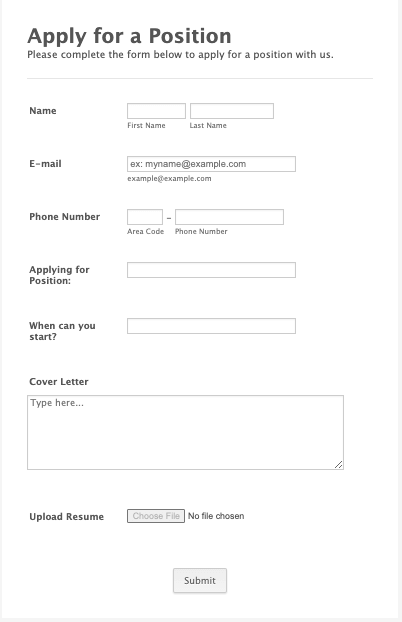Finding the right employees for your business is a key element of its success, and carefully crafting your job application form can help narrow down potential candidates. But it’s important to put thought into your application form, not only to ensure that it collects the candidate information that you need, but also to make sure that you’re not accidentally asking illegal questions.
Illegal job application questions to avoid
Certain laws and acts protect job applicants against discrimination and inquiries about private information. For example, the Immigration Reform and Control Act states that employers can’t discriminate against applicants who aren’t citizens of the United States. The Americans with Disabilities Act prohibits employers from asking questions about a candidate’s health problems or disabilities.
As you design your job application, be sure to avoid any questions that reference the following information, since they’re likely illegal.
What is your age and birth date?
Asking for a candidate’s age can imply age discrimination. The same is true of asking about a candidate’s graduation date. The only exception would be for a job that requires a minimum age, such as a job that requires a driver’s license. In these cases, you can ask if the candidate is the minimum age or older, but don’t ask for their specific birth date.
Do you have any disabilities or health issues?
It’s illegal to ask candidates questions about health issues, medical conditions, weight, and disabilities. The ADA prohibits these types of questions to protect candidates’ privacy.
What is the highest level of education you’ve completed?
Unless a job requires a certain amount of education, it’s best to avoid asking about a candidate’s level of education. Asking questions about education could result in excluding qualified people who might only have a high school diploma.
What is your citizenship status and ethnicity?
It’s best to avoid any citizenship questions on a job application, since the Immigration Reform and Control Act prohibits discrimination against applicants who aren’t U.S. citizens. Instead, you can ask if an applicant is legally allowed to work in the country.
What is your marital status and family status?
State and local laws often prohibit employers from discriminating against candidates based on their marital or family status or sexual orientation. Avoid questions that ask about whether candidates are married, including requests for a candidate’s maiden name.
Why were you discharged from your military service?
An employer can’t ask questions about why a candidate was discharged from the military. These questions could lead to disability information, which is prohibited by the ADA.
Do you have a criminal history?
“Ban the box” laws in many states prohibit employers from asking about an applicant’s criminal history. This helps ensure that applicants who’ve been convicted of a crime aren’t automatically disqualified because of their past.
What is your Social Security number?
There’s no need to collect an applicant’s Social Security number until you’re ready to move forward with a background check. Asking for this sensitive data puts an additional burden on your business to protect that data, so don’t ask for Social Security numbers until you absolutely need them.
What is your salary history?
Many states now prohibit employers from asking job candidates about their salaries at previous positions. It’s best to avoid this question.
Strategies to keep your job application process legal
With so many potential illegal application questions, it’s essential to carefully design and review your application. Familiarize yourself with local and state laws, and consider having a lawyer who specializes in employment law review your application.
Try to design one application with consistent questions that you can use for any job opportunity that becomes available. You should be able to adjust the job description but keep the bulk of the application the same; that way, you’ll avoid having to repeatedly rewrite the questions and send them to your lawyer for review.
In addition to avoiding illegal job application questions, you also need to be aware of and avoid illegal job interview questions. The interview process can be tricky, since you might be tempted to ask questions that you think of during the interview. It’s best to stick to a list of prepared job-related questions that your lawyer has approved.
To help keep the hiring process running smoothly, consider using a platform like Jotform to create, store, and share your job applications. Jotform’s drag-and-drop interface is easy to use, and with more than 10,000 free form templates available to choose from, you can select a job application template and tailor it to your needs to save time.
As you create your job application form, you can save it as a template. Then you can change the job details and reuse the form as you advertise different positions.
You can share your form in a variety of ways — on your website, through email, and more — making it easy to reach a wide range of candidates. Job candidates can complete the form online, and you can collect and review the results, streamlining the process and ensuring you don’t overlook that perfect candidate.





































Send Comment: